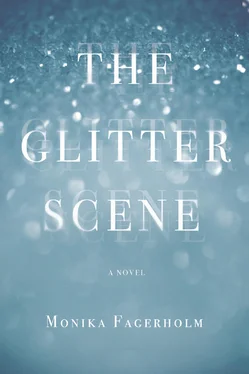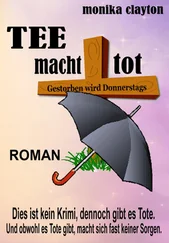“You have to be careful. You have to come to love. New.”
“You’ve said that too—”
And silence, when it zooms through Susette’s head of course that fundamental silliness in everything Maj-Gun is saying about the Boy in the woods, again: in other words, one Bencku in a barn where people partied and Bencku partied the most and for a while in his youth that made an impression, plus the fact that he was good-looking and the girls in the District had taken their bikes out there just in order to sit, lined up along the walls of the barn in the darkness, slowly becoming DRUNK too while waiting to be seen and some were cuter than others and then they were seen more often and so on. Starling darling kiss ready for the evening entertainment . It must be Maj-Gun Maalamaa in order to get something meaningful out of that.
But at the same time, on the other hand. Something that effectively obscures all desire to laugh for example. The three siblings. The cursed ones. Bencku, Rita—and Solveig. And Doris Flinkenberg, with the folk song. Not because Susette had not known, but she had, so to speak, not thought about Solveig that way. Solveig in the company car, Doris Flinkenberg on a cassette tape. Nah, Susette does not know anything about Doris, that fall when she killed herself, Susette had not been in the District any longer. And the cousin’s house, where Susette had cleaned, cleaned, the old man, the cousin’s papa. Who had died—and not that long ago either. And there, in the cousin’s house, after the ambulance had left she walked around with death in her hands.
And so, still, how all of that is also suddenly obliterated because of another image, another scene.
Just: a terrified girl at the cemetery, Maj-Gun with the mask, the Angel of Death Liz Maalamaa.
“Damn it, Maj-Gun! You scared her! With your damned mask! And do you HAVE to say the Boy in the woods all the time? He’s probably a hundred years old and his name is Bengt!”
•
Damp. Down on the ground, reality. Maj-Gun grows quiet, does not say anything, looks down—at her hands, her nails.
“My bladder is about to explode,” she says then and gets up. “I have to go pee.”
And she walks out into the hall and into the bathroom. Susette gets up off the couch too, opens the window slightly and fresh air pours into the room. Starts picking up empty coffee cups, empty ice cream bowls and carries them into the kitchen and turns on the hot water and puts the dishes to soak in the sink.
A relief, as if something had let go, no fury, nothing is pounding now. No “What does Maj-Gun want from me? What is she doing in my apartment?” No feeling of connections, rags, fungus.
But just ordinary, normal. The cat is purring at her legs now, begging for food because it is hungry. Susette takes a can of cat food out of the cabinet, looks for the can opener but as usual does not find it, takes the old pair of scissors instead, uses the tip to make a gash in the lid of the can and bends it up, ladles the food out onto a plate and sets it on the floor in front of the cat who starts eating.
Hears Maj-Gun behind her, coming from the bathroom, and in the midst of everything Susette thinks of something funny, which is also an ordinary way of finishing a conversation.
“Maj-Gun!” she calls. “Maybe you’re right. Maybe you don’t need to wait so long. The Boy in the woods. Bengt. He inherited the whole house.”
But then Maj-Gun is standing in the doorway with a pistol in her hand.
“Damn, Susette. What are you doing with a revolver in your sauna bag?”
•
On the other hand, still, at the newsstand, a few evenings later. “More cat food?” Maj-Gun in the doorway, puffing on a cigarette that she tosses away half smoked when she catches sight of Susette who is approaching across the square, holds the door open, bows. “Just because you’re a duchess—” Susette shakes her head, Maj-Gun does not finish the sentence, they go in.
“Think about what Madonna has done for fashion! It’s crazy! Djeessuss!”
A girl is crossing the square, they see her through the window where they are, as always, sitting on either side of the counter among all of the magazines, lottery tickets, games. The same girl as all the times before: hair teased, bow in her hair, medium-length leather jacket, knickknacknecklaces. And Maj-Gun who yells what she has yelled a thousand times before, and lacking just as much irony in her voice—the opposite, almost filled with reverence, esteem.
Susette who laughs, Maj-Gun who stares at her, and speaks so that it sounds like an accusation:
“You’re so spaced out, Susette. Don’t know anything about what is going on!
“If I looked like you, Susette. Not exactly what you look like now, but the potential .
“Come along and change!” Maj-Gun calls out. “With you as bait, Susette. To life, an invitation. NOW we’re going to the disco.”
And that is what they do the following Saturday when Maj-Gun does not have to work: go into the city by the sea and buy clothes and then they go to the disco. Only clothes for Susette, because there is nothing in large enough sizes in the regular stores for Maj-Gun, something she cheerily points out. She is wearing what she calls the tiger blouse party shirt: an ill-tempered leopard mouth with red sequins that swell over her stomach.
And Susette in the fitting rooms in the stores, in the junior department: Maj-Gun who is lugging clothes between the fitting room and the department, fitting room and department, serving as fashion adviser, choosing and deciding. Dresses Susette up for all she is worth, like bait. Broad-shouldered yellow blazer, aviator pants with creases, and in front of the mirror in the restroom at the train station Susette’s hair is combed back into a curly, poodlelike hairstyle with a ponytail.
The disco is enormous, an ash-gray hall; Susette is sucking on a Blue Angel, which is a blue drink with an umbrella stuck in the glass with white foam on top. “It’s stardust,” Maj-Gun explains when they take a seat on a group of couches suitably close to the dance floor, “stardust stardust,” stirs her finger in the whiteness, sticks her finger in her mouth, “mmmmm.” Raises her milk glass—Maj-Gun never drinks anything stronger—says cheers! One Blue Angel, two Blue Angels, and a few more: Maj-Gun picks umbrellas out of the glasses as Susette finishes them, one after another, places the umbrellas in a row on the table. Maj-Gun orders new drinks from the waiter or goes to the bar herself and brings more when the hall and the sofas fill with people; “you can’t yell waiter because then they’ll get offended!” Maj-Gun drums her fingers on the low coffee table in time with the music and Susette is drinking, later dancing—drinking, dancing, boys are asking her to dance. One boy after another, boys boys how they crowd around her: “She has good luck!” Maj-Gun laughs when Susette returns to the sofa between the dances only to immediately have a new boy there who is going to lead her out onto the dance floor. “Luck, luck.” Maj-Gun laughs until she stops laughing, new people sit down on the sofas, lots of people, strange people, forcing Maj-Gun farther and farther into the corner. Susette too, of course, but then she is not really there but on the dance floor, on the dance floor the entire time, and gradually Maj-Gun grows quiet, just sits, does not say anything at all anymore.
But Susette on the dance floor: under the blue, white lights, in the smoke that comes from the floor and whirls around the dancers under the disco ball turning around around silver and glittering on the ceiling. Susette who is dancing, dancing—and sees Maj-Gun at a distance, on the sofa, among all the unfamiliar people, squeezed in between them, in the corner. And not that Maj-Gun is looking in Susette’s direction any longer, does not try to make eye contact with Susette in order to signal an understanding like she did earlier in the evening. Now, is sitting, is sitting where she sits , among all the ordinary girls and boys who are swelling in every direction on the group of sofas, pretending not to notice Maj-Gun, not bothering about her, Maj-Gun is like air to them. But yet, it is still Maj-Gun who, due to her size, is the most obvious of them all. Is shining, fleshy white around the arms, paler than ever: Maj-Gun like a beacon through the gray smoke and silver light, a leopard mouth adorned with sequins exploding over her enormous bosom and a half-filled glass of milk on the table in front of her that she no longer touches.
Читать дальше











